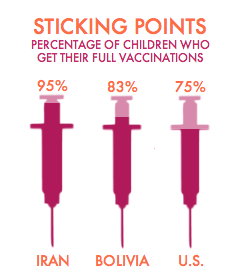
August 26, 2013 | Education, Violence Against Women, Economic Opportunity
They’ve Got Our Backs
When foreign aid money gets handed out, Women Thrive makes sure a fair chunk goes to women.
In just a few weeks, presidents, prime ministers and heads of state from around the globe will converge on New York City for the UN General Assembly, where the talk will undoubtedly be of unrest in Egypt, food shortages in Africa, and violence in Central America.
But one group will be making sure the gathered decision-makers focus on a population whose well-being could determine the fate of the world: women. Since 1998, the nonprofit Women Thrive Worldwide has successfully lobbied policy makers in Washington, D.C. and in foreign countries to meet the needs of women, who constitute the majority of the planet's poor and six in ten of the hungry.
It's going to be a busy autumn for Women Thrive—UNGA is only one of its targets. But these jam-packed months could add new landmarks to the group's past triumphs, which range from persuading the U.S. government to send assistance to female survivors of the Asian tsunami to advocating that the State Department implement a policy that considers gender equality when handing out foreign aid.
At the UN General Assembly, Women Thrive will be pushing the UN to focus on improving the quality of girls' education in developing countries. It's "not just about fairness and helping more girl access education," says Laura Henderson, Women Thrive's director of education. Rather it's about "trying to move the global community from looking merely at the number of students in school seats to what students are getting out of being in those seats."
Education for women and girls is one of the keystones of Women Thrive's mission. Its other core topics: Food security; international assistance as a force for change; and preventing violence against women and girls.
That last issue will pick up steam in September. Because one out of every three women is a victim of sexual or physical violence during her lifetime—in some countries the proportion is as high as 70 percent—Women Thrive is working to get the International Violence Against Women Act introduced into the U.S Congress. The bill would ensure that when U.S. aid dollars are handed out to a foreign country, priority is given to programs that help combat violence against women and girls—a first for the United States.
If passed, the act would affect US foreign policy in countries from Pakistan to Guatemala, from Ghana to Egypt to Sierra Leone. To help make its case for the act, Women Thrive will ensure that members of Congress hear from women like India's Pooja Taparia, who founded Arpan, a nonprofit that prevents sexual violence against children and helps heal its victims. India, by some accounts, has the world's largest number of sexually abused children.
In October the spotlight moves to the issue of women and food security. In many countries, farmers are typically women—which is why women are the key to solving the world's food crisis. During the World Food Prize Symposium to be held in Iowa from October 16 to 18, Women Thrive co-founder and president Ritu Sharma will lead a panel with Britain's former prime minister, Tony Blair, and philanthropist Howard G. Buffett as they discuss women’s role in reducing hunger on a global scale and efforts to promote local ownership.
The U.S. Congress, the UN, the World Food Prize…Women Thrive may seem to operate in a rarified atmosphere. But its work always comes back to the women on the ground who benefit from its lobbying. Just one of many success stories: A Honduran farmer named Maria, from outside Marcala, who is growing more coffee, aloe, vegetables and corn than ever before, and using the profits to feed and clothe her family—and to keep her kids in school.
Maria’s upturn started with Women Thrive's fight for a five percent increase in the number of women served by the US Millennium Challenge Corporation. In human terms, it meant that Maria obtained access to irrigation.
Women Thrive staffers like to quote another beneficiary of their work, Dona Erlinda Ramirez, of Nicaragua, whose burgeoning cheese business is lifting up her entire community. "There’s a saying, the early bird gets the worm," says Dona Erlinda. "But as women, we cannot wait to wake up."